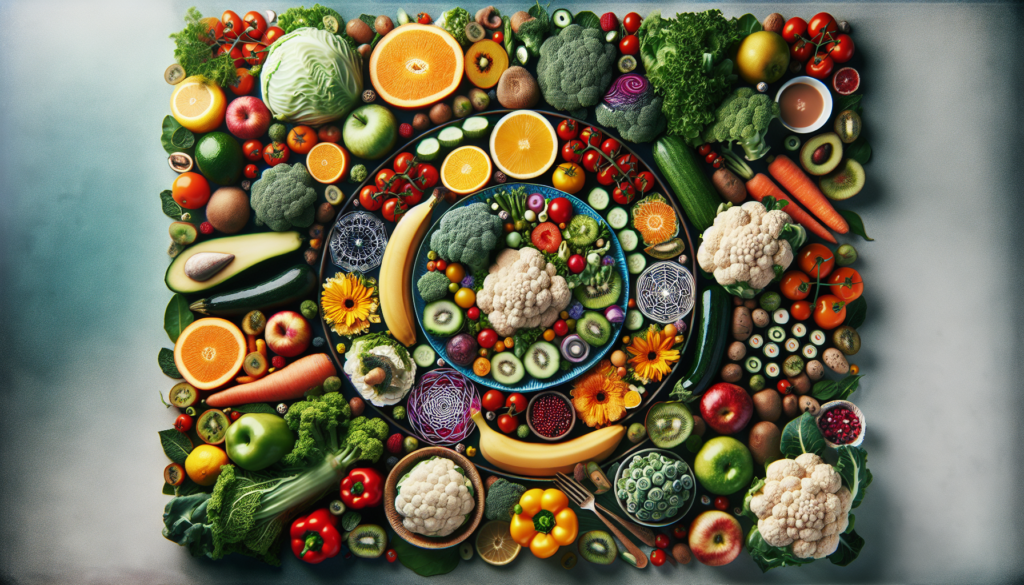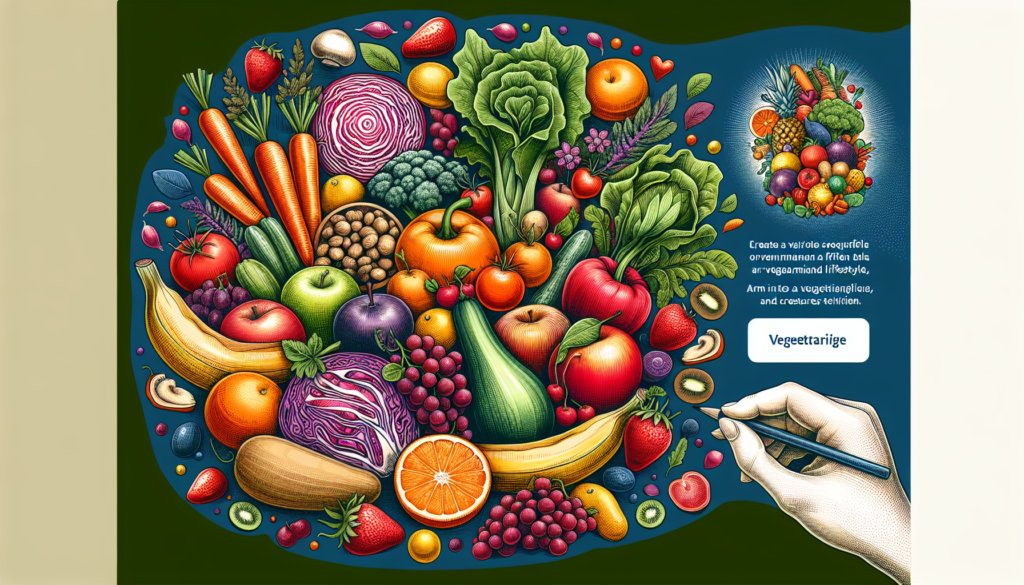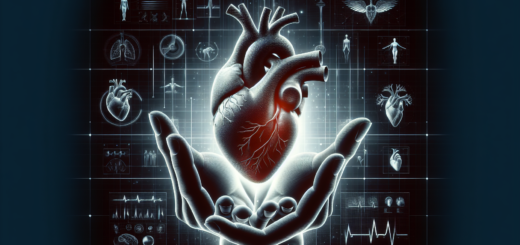Is it good to be a vegetarian?
Are you curious about the benefits of being a vegetarian? Many people wonder if following a vegetarian diet is truly advantageous for their overall health and well-being. In this article, we will explore the numerous advantages of adopting a vegetarian lifestyle, highlighting how it can positively impact your physical health, promote environmental sustainability, and even foster a sense of compassion towards animals. Get ready to discover the goodness that comes with embracing a vegetarian lifestyle!

Health Benefits of a Vegetarian Diet
Going vegetarian can have numerous health benefits for individuals. By opting for a vegetarian diet, you can lower your risk of chronic diseases in the long run. Studies have shown that vegetarians have a reduced risk of heart disease and high blood pressure, which are major health concerns worldwide. Additionally, a vegetarian diet can also help improve weight management, as it tends to be lower in calories and higher in fiber-rich foods. This combination can aid in weight loss efforts and help maintain a healthy weight.
One of the reasons why a vegetarian diet is considered healthy is because it typically includes a higher intake of fiber, vitamins, and minerals. Plant-based foods tend to be rich in fiber, which supports digestive health and helps prevent constipation. Consuming a wide variety of fruits, vegetables, whole grains, and legumes also provides a diverse range of vitamins and minerals that are essential for overall health and wellbeing.
Nutritional Considerations for Vegetarians
If you are considering adopting a vegetarian diet, it is important to ensure that you are meeting your nutritional needs. One concern that often arises is protein intake. However, with proper planning, vegetarians can easily consume adequate protein from plant-based sources such as legumes, tofu, tempeh, and seitan. It is important to note that while plant-based proteins tend to be lower in some essential amino acids, consuming a variety of protein sources throughout the day can help ensure that you are getting all the amino acids your body needs.
Another nutrient often discussed in relation to vegetarian diets is iron. While plant-based iron sources are not as easily absorbed by the body as animal-based sources, combining them with vitamin C-rich foods can enhance iron absorption. Additionally, vitamin B12, which is primarily found in animal products, is a concern for vegetarians. It is important to include fortified foods or supplements to meet the recommended intake of vitamin B12.
Calcium is another nutrient to consider, especially for individuals who exclude dairy products from their diet. Plant-based sources of calcium include leafy greens, tofu, fortified plant milks, and calcium-set tofu. Ensuring adequate calcium intake is crucial for maintaining strong bones and preventing osteoporosis.
Environmental Impact of a Vegetarian Lifestyle
In addition to the personal health benefits, adopting a vegetarian lifestyle can also have a positive impact on the environment. Livestock agriculture is a significant contributor to greenhouse gas emissions, and reducing meat consumption can help lower these emissions. By choosing plant-based foods, you are contributing to the conservation of water resources as well. The production of meat requires large amounts of water, and by reducing meat consumption, less water is needed for agricultural purposes.
Preserving biodiversity is another important environmental consideration. The expansion of livestock farming has led to deforestation and habitat destruction, resulting in the loss of numerous species. By embracing a vegetarian lifestyle, you are actively supporting the preservation of biodiversity and protecting natural habitats.
Moreover, a vegetarian diet also promotes lower energy consumption. The production of meat requires more energy and resources compared to growing fruits, vegetables, and grains. By reducing meat consumption, you are contributing to a more sustainable and energy-efficient food system.
Ethical Reasons for Adopting a Vegetarian Diet
For many people, ethical considerations play a significant role in their decision to adopt a vegetarian diet. Concerns about animal welfare are a compelling reason to opt for a plant-based lifestyle. Factory farming practices often involve crowded and unsanitary conditions for animals, leading to their suffering and compromised well-being. By choosing a vegetarian diet, you are expressing your compassion for animals and advocating for their rights to live free from harm.
Additionally, supporting sustainable and cruelty-free alternatives is a way to take ethical responsibility. The rise of plant-based alternatives to animal products, such as plant-based meats and dairy alternatives, provides viable options for individuals who wish to eliminate or reduce animal products from their diet. By endorsing and consuming these alternatives, you are encouraging the development of a more compassionate and sustainable food system.
Ultimately, adopting a vegetarian diet is not just about personal health but also about embracing a compassionate lifestyle and making a positive impact on the world around us.

Challenges and Potential Drawbacks of Being a Vegetarian
While adopting a vegetarian lifestyle comes with numerous benefits, it is essential to be aware of the challenges and potential drawbacks that may arise. One common challenge is limited availability, especially in certain regions where plant-based options may be scarce. However, with increasing awareness and demand for vegetarian products, accessibility is gradually improving.
Social and cultural considerations can also pose challenges for vegetarians. In social settings, vegetarian options may not always be readily available, making dining out and attending events a bit more challenging. Communicating your dietary preferences in advance and offering suggestions for vegetarian-friendly options can help overcome these challenges.
Another concern related to vegetarianism is the risk of nutrient deficiencies if the diet is not properly planned. While a well-balanced vegetarian diet can meet all nutritional needs, it is important to ensure adequate intake of essential nutrients such as protein, iron, vitamin B12, and calcium. Close attention to meal planning and incorporating a variety of nutrient-rich foods is key to avoiding deficiencies.
Vegetarianism and Weight Management
If weight management is a goal for you, vegetarianism can be a favorable choice. Plant-based diets are often naturally lower in calories and higher in fiber, making them effective for weight loss and maintenance. By focusing on whole, unprocessed foods such as fruits, vegetables, whole grains, legumes, and nuts, you can achieve a balanced and satisfying diet.
Strategies for maintaining a healthy weight include portion control and focusing on balanced meals. Practicing mindful eating can help you be more attuned to hunger and fullness cues, which can prevent overeating. Additionally, incorporating regular physical activity into your routine can support weight management goals and overall well-being.
It is worth noting that relying heavily on processed vegetarian foods, such as veggie burgers, frozen meals, and snacks, can hinder weight management efforts. These foods can be high in sodium, added sugars, and unhealthy fats. Therefore, it is important to prioritize whole food options and limit processed foods for optimal health and weight management.
Impact of Vegetarianism on Mental Health
While the physical health benefits of a vegetarian diet are well-established, its impact on mental health is gaining recognition as well. Research suggests that diet can influence mood and overall well-being. Individuals who follow a plant-based diet often report feeling more positive, calm, and have lower levels of anxiety and depression.
The connection between diet and mental disorders has been a topic of interest in recent years. While more research is needed, some studies have shown a potential link between high intakes of fruits, vegetables, and whole grains with a reduced risk of depression and other mental illnesses. The nutrients found in these foods, such as folate, antioxidants, and omega-3 fatty acids, are believed to play a role in promoting optimal brain health.
Balanced nutrition is essential for optimal mental health. Including a variety of nutrient-dense foods, such as leafy greens, whole grains, legumes, fruits, and nuts, in your vegetarian diet can provide a wide range of vitamins and minerals necessary for brain function and emotional well-being. Additionally, it is important to identify potential nutrient deficiencies and their effects on mental health to address any imbalances effectively.
Vegetarianism during Different Life Stages
Vegetarianism can be a suitable dietary choice during various life stages, including pregnancy and lactation. However, it is crucial to ensure adequate nutrient intake during these periods. Pregnant and lactating women should work closely with healthcare professionals to create a well-planned vegetarian diet that meets their increased nutritional needs, especially for nutrients like iron, calcium, omega-3 fatty acids, and vitamin B12.
For vegetarian children and adolescents, proper nutrition plays a crucial role in their growth and development. Ensuring sufficient intake of protein, iron, calcium, vitamin B12, and other essential nutrients is essential. Parents should work with pediatricians or registered dietitians to create balanced meal plans and consider fortified foods or supplements if necessary.
As individuals reach older adulthood, meeting nutritional needs becomes even more important. Aging can affect nutrient absorption, bone health, and overall well-being. A well-planned vegetarian diet that includes sources of protein, calcium, vitamin B12, and omega-3 fatty acids can support healthy aging and help prevent nutrient deficiencies.
Addressing common concerns and dispelling myths surrounding vegetarianism is also important at all stages of life. Assuring individuals that a properly planned vegetarian diet can meet all nutritional needs and supporting them with accurate information can help build confidence in their dietary choices.
Vegan vs. Vegetarian Diets: What’s the Difference?
Although both vegan and vegetarian diets exclude meat, fish, and poultry, there are distinct differences between the two. While vegetarians avoid animal flesh, vegans go a step further and avoid all animal products, including dairy, eggs, and honey. The vegan lifestyle extends beyond food choices and often includes avoiding products derived from animals, such as leather and cosmetics tested on animals.
When comparing the health benefits and risks of vegan and vegetarian diets, there are similarities but also some differences. Both diets can provide adequate nutrition when properly planned, but vegans may need to pay closer attention to certain nutrients such as vitamin B12, iron, calcium, iodine, and omega-3 fatty acids. Vegans may need to rely on fortified foods or supplements to ensure sufficient intake of these nutrients.
Ethical and sustainability aspects are often stronger motivators for individuals who choose veganism. By eliminating all animal products, vegans aim to reduce harm to animals and minimize their environmental footprint. The choice between veganism and vegetarianism ultimately comes down to personal values and dietary preferences.
Conclusion
In conclusion, adopting a vegetarian diet can bring numerous health benefits, ranging from reduced risk of chronic diseases to improved weight management. By embracing a vegetarian lifestyle, individuals can increase their intake of valuable fiber, vitamins, and minerals. The environmental impact of vegetarianism cannot be overlooked either, as it leads to reduced greenhouse gas emissions, conservation of water resources, and preservation of biodiversity.
Ethical reasons, such as concerns about animal welfare and opposing factory farming practices, are additional motivations for adopting a vegetarian diet. However, it is important to consider the challenges and potential drawbacks, including limited availability, social considerations, and the risk of nutrient deficiencies if not properly planned.
Vegetarianism can also play a role in weight management, as it allows for potential weight loss and encourages balanced meals. The impact of vegetarianism on mental health is increasingly recognized, with diet showing potential influences on mood and overall well-being.
Different life stages, including pregnancy, childhood, and older adulthood, require special consideration for vegetarianism. Proper planning and attention to nutrient intake are necessary to support optimal health and development. Lastly, the choice between veganism and vegetarianism depends on personal values and individual dietary needs.
By understanding the health benefits, nutritional considerations, environmental impact, ethical reasons, and challenges associated with vegetarianism, individuals can make informed decisions about their dietary choices. Ultimately, embracing a vegetarian lifestyle can promote improved personal health, the well-being of animals, and sustainability for our planet.
















It's great that you talked about how business insurance can provide financial protection against unexpected events and help ensure the…
I like that you mentioned how business insurance is essential for protecting your bottom line and the long-term viability of…